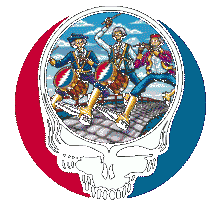NY Times reports on "web crackdown"

From the New York Times:
Deadheads Outraged Over Web Crackdown
By JEFF LEEDS
The Grateful Dead, the business, is testing the loyalty of longtime fans of the Grateful Dead, the pioneering jam band, by cracking down on an independently run Web site that made thousands of recordings of its live concerts available for free downloading.
The band recently asked the operators of the popular Live Music Archive (archive.org) to make the concert recordings - a staple of Grateful Dead fandom - available only for listening online, the band's spokesman, Dennis McNally, said yesterday. In the meantime, the files that previously had been freely downloaded were taken down from the site last week.
Dissent has been building rapidly, however, as the band's fans - known as Deadheads - have discovered the recordings are, at least for the time being, not available. Already, fans have started an online petition, at www.petitiononline.com/gdm/petition.html, threatening to boycott the band's recordings and merchandise if the decision is not reversed. In particular, fans have expressed outrage that the shift covers not only the semiofficial "soundboard" recordings made by technicians at the band's performances, but also recordings made by audience members.
To the fans, the move signals a profound philosophical shift for a band that had been famous for encouraging fans to record and trade live-concert tapes. The band even cordoned off a special area at its shows, usually near the sound board, for "tapers" - a practice now followed by many younger jam bands.
But more broadly, it suggests that a touchstone of baby-boomer counterculture - the recording made by and shared, sometimes via mail, among hard-core fans - may be subverted in a digital era when music files can be instantly transmitted worldwide.
The move comes as the group, which disbanded after the 1995 death of its leader and ringmaster, Jerry Garcia, has begun selling downloads of its live concerts through its own official Web site. The band (whose surviving members - the guitarist Bob Weir, the bassist Phil Lesh and the drummers Mickey Hart and Bill Kreutzmann - have since played together under the more compact name the Dead) sells album-length recordings of the shows at prices that can run from about $8 to roughly $16 a copy.
Unlike the digital files sold at popular music services like Apple Computer's iTunes or Real Networks' Rhapsody, the band sells its music as files that can be copied and transferred without restriction.
The independently operated Live Music Archive evidently posed unwelcome competition.
"These folks assembled a Deadhead's dream collection and made it available," Mr. McNally said. "When we discovered it, we decided to take a wait-and-see approach. Eventually, it was the band's conclusion, after a long discussion with them, to request that they change their policies" and make the live recordings available only as streams.
The contretemps makes clear that the band's decades-long support of fan recordings and trading did not anticipate the popularity of music online.
"One-to-one community building, tape trading, is something we've always been about," Mr. McNally said. "The idea of a massive one-stop Web site that does not build community is not what we had in mind. Our conclusion has been that it doesn't represent Grateful Dead values."
Most fans, he continued, "understand they were being granted an extraordinary privilege, and they responded by taking it very seriously" by respecting the band's wishes not to sell their live recordings. "This is not the same situation," he added.
David Gans, who is the host of a syndicated radio program, "The Grateful Dead Hour," said in an interview yesterday that the battle is rooted in the band's "historically lackadaisical attitude toward their intellectual property." He added: "When they were making $50 million a year on the road, there wasn't a lot of pressure to monetize their archives." Now, however, it may be difficult to put the genie back in the bottle. While the move to revise the Live Music Archive may deal a blow to what many fans considered an organized library of material, "the idea that they could stop people from trading these files is absurd," Mr. Gans said, adding: "It's no longer under anyone's control. People have gigabytes of this stuff."



0 Comments:
Post a Comment
<< Home